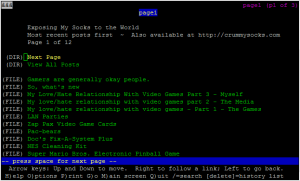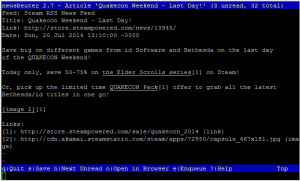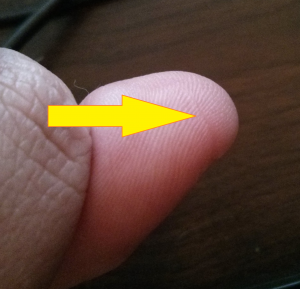Welcome to part two of my series exploring my relationship with video games. Part one is available here. I’ll wait while you get up to speed, and you can join me in the next paragraph.
Writing is hard. Maybe I should qualify that a little bit: writing things is easy, any schmuck can go to his local library, access a computer, and start up a blog for the low price of free. And just like that, you’re a blogger. No requirements, experience, or anything required other than being able to remember a password. The barriers to entry are the lowest they’ve ever been to be able to write about whatever pops into your head and present it before a worldwide audience. It’s actually kind of ridiculous. But actually getting someone, anyone, to read what you wrote? That’s the hard part. No matter how good your writing is (or how good you think your writing is), unless you get an audience for it, you’ll be just about as effective sitting at a rest stop in the middle of Arkansas, writing your articles in a spiral notebook, crumpling them up and throwing them at anyone that happens to walk by, and hoping that they’ll be interested enough to read what you threw.
So, you take the advice of the Old Guard that have been where you are now. The people who started out with nothing, grew it into a publishing empire, and get paid to do what you’ve wanted to do since you could hold a pencil: they get paid to play and write about video games. You write what you know. But you find that, since you’re not already in the news business, you don’t really know all that much that nobody else already knows, and what you do know has already been reported on by everyone. But, I mean, people already do that, right? Any major news story is going to be reported by everyone, so you can just use their same stories, slap a veneer of your own couple of sentences of commentary, and you’ve got a news article. Keep doing that all day every day and you have yourself a news site.
Kind of.
Creating something original that’s consistently great (or at least good) is hard, and the people who are truly great at it can make it look easy. So easy that people will see something successful, and immediately emulate it, maybe changing one or two details to ‘make it their own’ (“Everybody loves nostalgia, right? So how about we make a video series talking about some old games, but the hook is that the guy talking about them is furious. All the time. It’ll be hilarious!”). The problem is: it sometimes works. We eventually get to the point where (in this case) video game news spread across dozens of big sites and hundreds (maybe thousands) of smaller sites becomes a homogenized grey mass, with the occasional original piece thrown in for color. That’s just a fancy way of saying that the bulk of most video game news sites are interchangable, so why would I bother visiting more than one? For the original content? Nope. If Kotaku posts something interesting, Destructoid will mention it. If Joystiq posts something worth reading, the MTV Multiplayer blog has you covered.
That’s not new, I have some experience in the news industry, and it’s how news reporting has works. It’s understandable, really. There are only so many hours in a day, and if you had to personally research and vet everything that you posted, you’d only get two or three stories a day done, maximum. The world of video games is bigger than it’s ever been, and yet practically the only place you can find coverage of the industry is on the Internet. And on the Internet, for better or worse, coverage == blogs.
Blogs are interesting. They are (usually) easier to update than a static site, they can be updated any time by anyone without having to figure out how to upload a few new .html documents via FTP, and are good for things like a personal diary or, yes, even news coverage. In fact, that you’ll be hard pressed to find a site covering video game that isn’t a blog.

So many blogs
Why is that? Because it works. Why does it work? Well, for me, that’s trickier.
I grew up reading computer and video game magazines like BYTE and Compute!, and eventually stuff like the How to Win at Nintendo Games series, Nintendo Power, EGM, and the occasional GamePro. All of those are defunct now (although EGM has been revived, apparently), but before they left, they impressed one thing on me: people who write about video games (even when what’s getting written is aimed at a child) have a certain style. They would sometimes use words I didn’t know, which was totally fine, they’re professional writers, after all, I could glean the meaning or go research what the thing meant, which was great. It slyly made me learn something I would have never learned on my own while I was learning about something I wanted to know. It reminds me of a quote by Stan Lee (you know, the comic book guy (no, not that Comic Book Guy)):
“People thought (comics) were just for very, very young children or semi-literate adults; nobody had any respect for comics,” Lee said. “Little by little — and I’d like to think Marvel had something to do with that — I started using stories that had college-level vocabulary. I would use whatever word is apt in a sentence. If I would use like — oh, I don’t know — ‘misanthropic,’ let’s say, I’d go ahead and use it. I figured if the kids didn’t know what it meant, they’d get it by osmosis, by the use of the sentence. If they had to go to the dictionary and look it up, that wasn’t the worst thing that could happen.”
Which just a lot of words to say that these early writers started covering an unfamiliar medium using conventional media, and didn’t dumb down their writing for the masses. Things were a little stuffy, sure. But I loved it anyway. I always loved how the books and magazines I got my hands on felt like the writer was having fun exploring each of the games or programs he was covering. It’s like I had a relative who worked at the game factory, got the game a couple months early, and was excitedly telling me all about it.
Coverage of video games nowadays typically bucks all of that.
Sure, they put on the veneer of ‘hey, we like video games as much as you do, you should come let us tell you all about them (please visit our sponsors and click our ads)’. And that may be true, on a strictly personal level. The individual authors might actually love video games, but I do sometimes wonder (playing a lot of games is not necessarily the same as loving games). Regardless, the way old media covers news just doesn’t work well for video games, now that the Internet is a thing. Print and broadcast media are just animated corpses who don’t know they’re dead, and will continue shambling on until their viewership dies and that recurring subscription drawing directly from their checking account that they forgot about setting up in 1998 finally stops. Besides, websites are easier to update, can get information to more people more quickly, can be corrected in real-time if errors are discovered, and so on. Which is all true. And video games are a unique product, they combine elements of books, theater, music, art, mime, imagination, interactivity, and so on into a multimedia product that stands alone.
Websites are uniquely positioned to cover video games precisely because games and websites can both be a multimedia experience. We can get an image, hear a sample of a song, see the game in action. We can vicariously experience every facet of the game itself without actually playing the game. That’s huge.
But this is the Age of the Internet. We want more. So news sites get lots more screenshots and preview videos, because those are easy enough to get and to distribute to everyone.
But we want more.
So they track down concept art, game play trailers, and developers will sometimes cobble together ARGs to increase awareness of games. It’s a little more work, but you can’t start the hype machine too early, right?
But we want more.
So sites start to bug developers to give out any morsel of information about whatever they’re working on. We scour twitter and other social media pages for anything even resembling news, because game developers can’t have normal lives on social media, they have to answer questions about their games constantly, we obsessively check the trademark office to see if something’s been registered that might possibly be the title of a game a developer might be working on now or in the future, or not at all. It’s all filler, of course, but you have to put up something to take up the time between the Good Stuff(tm), right?
But we want more.
There isn’t much more in the official channels, so sites will start posting rumors, water-cooler talk, and what few unique pieces might come from other sites that you don’t visit (so you don’t have to sully your fingers by going there yourself, you see). It’s filler that gets put up between the filler we mentioned above. If we don’t have something new up for our readers every time they refresh the page, then they might look at another website for a few seconds, and that means that we’ve failed.
But we want more.
It’s New Games Journalism, and I’ve grown to hate it.
I realized a while ago that blogging can be a form of journalism, if done right, but a lot of the blogs just don’t do it right. They update so often and many of the articles have so little actual content, that I gradually began to tune them out in favor of the actual original pieces. The news and original reviews that I was coming to the site in the first place to see began to get more and more unpalatable. In an earlier article, I called it Nerd Pride or Nerd Arrogance, but I think it’s more accurate to call it Nerd Hubris. I pick on Destructoid a lot for this, because they’re one of the worst offenders (“We’re so awesome that you should visit our site and love us because we’re so awesome and edgy, and we’re also attention junkies, just like you would be if you were awesome like we are”). Other sites are more subtle, but the subtext of a lot of the articles is the same.
And I don’t have to like it. I could try to change the status quo. To buck the trend of those already bucking the trend, and try to at least start my own site, covering things the way I want them to be covered. Without all the navel-gazing, the hip-edginess, the firehose of constant updates in favor of longer, more researched pieces, and so on.
But I can’t.
I don’t have the time, the energy, or the connections to do anything like that full-time. I could throw away my current career and try to get a job at one of these places, you know, try to change them from the inside. But:
- If the hiring managers from one of those sites reads this article, I’m pretty sure they won’t want to hire me. Don’t want any trouble-starters, you know. Even though starting trouble and bucking the system is what they do
- For the less edgy sites, my lifelong passion for video games, and the nearly 12 years I’ve spent documenting is is completely worthless, as far as writing experience goes (believe me, I’ve applied to every site mentioned here, on and off since at least 2004)
So, am I bitter, angry, antagonistic, or some other negative adjective? No, not any more. I just have to change where I get my news. Once I stopped going to websites with writing styles I didn’t like that were covering games I didn’t care about, I started to feel a lot better about video games as a whole. And, yes, it’s true that I don’t usually know when the new Gears of Duty is coming out. Or obsess over every instance of a game developer losing his mind. But instead I have a lot more time to play the games I buy rather than obsessing over every detail of their inception, production, and release, then moving on to the next one as soon as they come out. I can enjoy video games on my terms. I’m not under constant pressure to get the new, hot thing, and I can appreciate games as more than an ephemeral experience.
And that’s really what it’s all about anyway.




